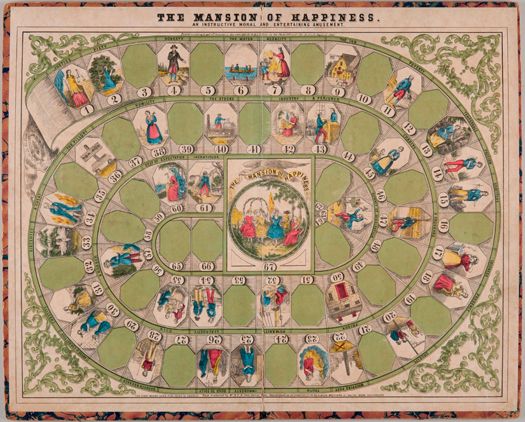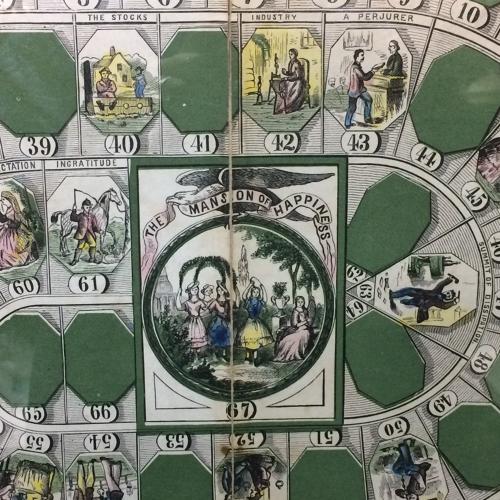In 1843 Parker Brothers introduced one of the very first board games ever published in the United States: Mansion of Happiness. Unlike the placing of workers or building the decks of today’s games, those of that era required you to twirl a spinner to determine your fate.
The object of Mansion of Happiness is to be the first player to travel around the spiral track and reach the Mansion of Happiness at the center of the board. Being that Mansion of Happiness was based on the Puritan world view, even the game mechanics were pious. A spinner was utilized rather than dice, because rolling bones was then associated with Satan and gambling.
Winning requires players to race past spaces labeled Humility, Charity, and Generosity, hoping to avoid Whipping Post and Prison, in order to be the first to reach “heaven” in the center of the 18″ x 15″ board. Virtuous deed spaces like Honesty and Temperance move players forward to eternal happiness, while vices such as Cruelty and Ingratitude move players backward.
Here is a blurb from the rules of Mansion of Happiness:
“Whoever possesses Piety, Honesty, Temperance, Gratitude, Prudence, Truth, Chastity, Sincerity…is entitled to advance six numbers toward the Mansion of Happiness. Whoever gets into a PASSION must be taken to the water and have a ducking to cool him…Whoever posses[ses] Audacity, Cruelty, Immodesty, or Ingratitude, must return to his former situation till his turn comes to spin again, and not even think of Happiness, much less partake of it.”
Honestly, I’m not even sure if I understand what all that means because what was instructive in 1843 sounds old-fashioned today. But in fairness, while that might sound silly to us today, I don’t really understand the word “ship,” I can’t fathom why Ariana Grande is famous, and I have no idea what half of the emojis mean and I’m afraid to use them because I suspect they are dirty. Language and culture changes.
But here’s the fun fact: You’ve probably played Mansions of Happiness without even knowing it. By the turn of the 20th century, Milton Bradley had rebranded it, creating the classic board game Life.
Says Robert Rath, “That journey from religious teaching aid to cradle-to-grave simulation not only tells us much about how American values have changed and adapted, it also offers a window on how board games made the pivot from moral guides to entertainment products.”
There weren’t many board games in America at that time. In fact, some of the few that did exist were simply imitations of Mansion of Happiness, most notably The Games of the Pilgrim’s Progress, where players began at the City of Destruction and passed abstract scenes such as The Cross and The Valley of Death before attaining final victory in The Celestial City, all borrowed language from The Pilgrim’s Progress, a 1678 Christian allegory written by John Bunyan.
If you’ve played Life, you realize the game isn’t much fun. You flick the spinner and move. There isn’t much more to it. But not many games were played at that time – there simply wasn’t time for it. Agrarian America was a society of constant manual labor by people of all ages, meaning that only the children of the very rich could afford an idle hour to waste on playing games.
Says Rath, “But that began to change during the industrial revolution, when childhood was identified as a distinct time of life – a learning period where society used both play and study to shape children into productive adults. Simultaneously, the country’s new industrial techniques and products could, for the first time, manufacture games on a mass scale.”
Critically, if you were spending time on a game, you might as well make it be morally instructive, right? So, the purpose of these mid-19th century American board games, then, was less to provide entertainment and more to make clear the lessons of American Protestantism to the children who played them. Although there was likely an element of uncomfortable comedy when children giggled as their friends landed on the space marked “Whipping Post.”
But time passed and a secularization of board games was in full swing. The Industrial Revolution saw America take a sudden movement away religious life and toward capitalism. Towns replaced farms and factories created careers, meaning the concepts of upward mobility and leisure time took root.
Within fifty years, games had gone from preaching religiosity and hard work to celebrations of easy wealth. Monopoly anyone?
This trend has only continued. Games are no longer thought of as a teaching tool for children, they are more often thought of as entertainment for adults. The messages of morality in Mansions of Happiness have been exchanged for Cards Against Humanity.
But at least games don’t have spinners anymore.



